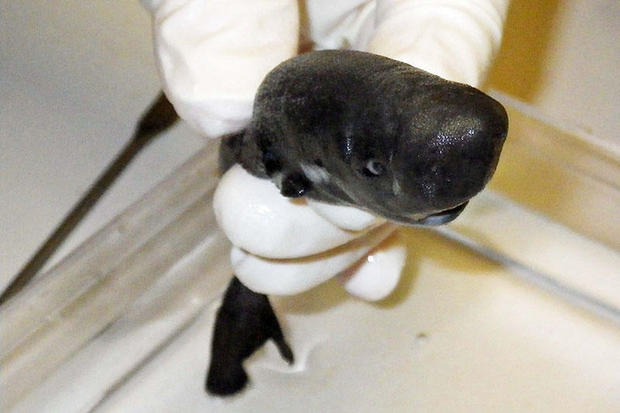A new species of shark has been identified in the Gulf of Mexico by a team of researchers, and the creature has one very distinctive feature — it glows in the dark. The glowing shark measures just 5.5 inches long, according to a study published in the Zootaxa journal.
The researchers from NOAA and Tulane University determined the small kitefin shark, which was found in 2010, is an American pocket shark based on five features, they explained in a Tulane press release. It has two pockets near its gills that secrete a luminous fluid, which could help the shark attract prey.
The only other known variety of pocket shark was discovered in the eastern Pacific Ocean in 1979. That shark is now in the Zoological Museum in St. Petersburg, Russia.
DOOSEY
“In the history of fisheries science, only two pocket sharks have ever been captured or reported,” Mark Grace of NOAA’S NMFS Mississippi Laboratories said in the press release. “Both are separate species, each from separate oceans. Both are exceedingly rare.”
While this shark was caught in 2010 during a mission to study sperm whale feeding, Grace first came across it in 2013 while examining specimens that were collected during the NOAA survey. Grace and researchers at Tulane then began studying the shark, examining its external features as well as taking X-rays and CT scans.
Researchers also got help from the European Synchrotron Radiation Facility (ESRF) in France, which produced X-rays 100 billion times brighter than the X-rays used in hospitals.
Researchers identified several notable differences between the original Pacific Ocean pocket shark and the newly discovered species from the Gulf of Mexico. While both species both produce the glowing fluid, they have a different number of vertebrae, different teeth, and the Gulf specimen has light-producing photophores that cover much of the body.
“The fact that only one pocket shark has ever been reported from the Gulf of Mexico, and that it is a new species, underscores how little we know about the Gulf — especially its deeper waters — and how many additional new species from these waters await discovery,” Henry Bart, director of the Tulane Biodiversity Research Institute, said.


